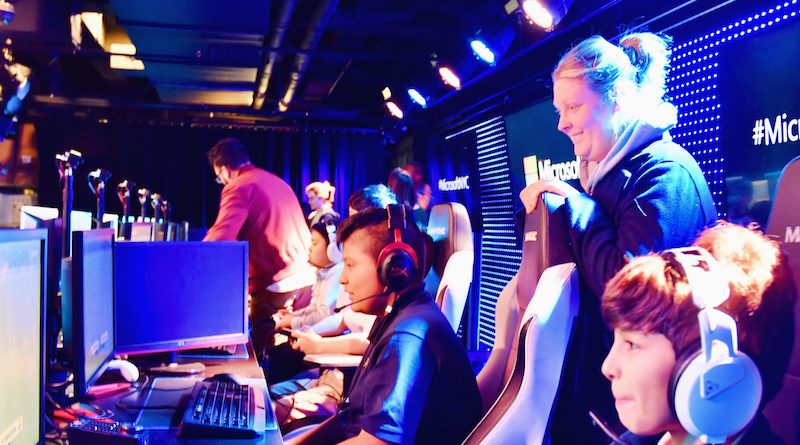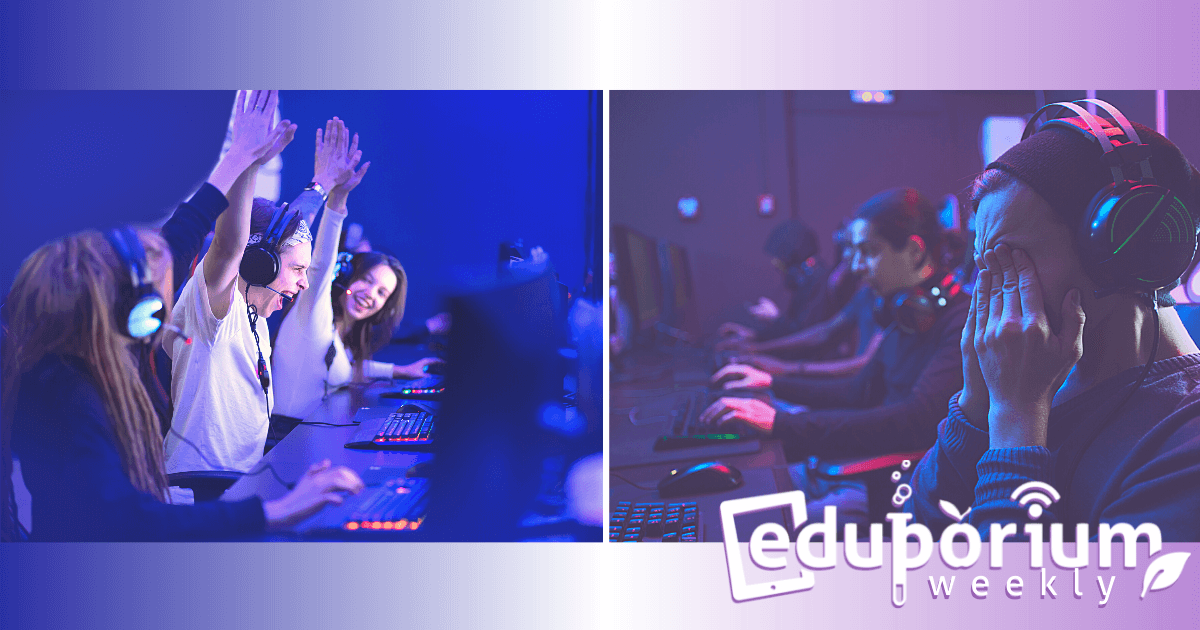Esports continues to gain popularity, traction, and attention—even below the professional level. It provides gamers, including students, with many short- and long-term benefits that can help them out in many ways. As with many trends, however, there are plenty in the education world who are skeptical about investing in esports programs. While some people definitely worry about drawbacks and the disadvantages of esports participation, there are many positives as well. For us, we're strictly focused on how to integrate esports in middle schools, high schools, at the collegiate level (usually more on the informal side), or as part of an afterschool club. And, like with many new fads, there are both pros and cons of esports to consider.
Reasons to Give Esports a Shot
Let's start with some of the positives we associate with interscholastic esports. Somebody new to this area might be entirely unfamiliar with just how esports can improve outcomes for teens. Over time, however, it can help enhance academic, social, and career-related progress. It all depends on how educators integrate esports in their schools but, whether it starts as an informal club or you are jumping right in to competitions against other school teams, they should see some positive results. The first pro of interscholastic esports is giving students the chance to create new relationships. Esports is a team endeavor and students have to work together. They also practice together, strategize, and spend time with their teammates. So, by sharing the same interests and desires for success, they can also strengthen their relationships—something that is especially important for those who may struggle on the social side of things.
Esports benefits and SEL.
When working to convince school administrators to invest in school esports, comparing it to other popular sports is a common approach. Like football, basketball, and soccer, esports often helps bring unconnected students together. With these newfound relationships and that increased sense of belonging, students tend to achieve a greater social-emotional balance as well. And, with that greater sense of balance, they could wind up feeling more comfortable throughout the school's campus. Plus, with that new comfortability, they may also see improved academic performance. It's certainly a bit cyclical (and best-case scenario) but it is very possible. From there, students can potentially (it's still very challenging) earn an esports scholarship to compete in college. And, at the very least, they may learn about a potential new career area to explore.
Exposing students to new career options.
Careers within the esports industry are booming—and they are not just for gamers. Tying esports to career and technical education can help attract even more children to school programs. You may know how big esports has become around the globe. This has led to countless career opportunities emerging in only the last few years alone. Esports teams need managers—this could be similar to a sports management major. They also need marketing, publicity, and graphic designers. For students with interest in both gaming and communications, they could focus on tying esports and marketing together. There are also broadcasting opportunities, streaming opportunities, and social media opportunities. Students could also explore some connections between esports and business management when it comes to designing and selling apparel, managing admissions, and setting up events. The list of potential opportunities really goes on and on.
Some Downsides to School Esports
Besides the near guarantee of parents and administrators being skeptical, there are other potential issues with starting a school esports program. They're not always the first things you'd tend to think of, however. Whether it's a teacher or administrator who sees the value of interscholastic esports or a student trying to sell decision makers on its value, the road to acceptance may be bumpy. So, it may begin with convincing decision makers that esports has more in common with traditional afterschool programs than they likely realize. We really can't fault parents, athletic directors, or educators for their skepticism, either. Esports is still such a new phenomenon that we are really just scratching the surface with understanding everything about it. The assumption that it's nothing like traditional school sports, however, is erroneous.
Some of the initial struggles.
The first challenges educators will discover include the costs of gaming equipment, finding a dedicated space for the team, and convincing a faculty member to coach. From there, it's much like managing any other school sports team, however. The superintendent and athletic director will have to start by working with officials from other schools to create your schedule. If you make it through the initial launch, however, then you might be in the clear. But (of course there's a but), there are some longer term effects to consider as well. Just as sports, specifically football, come with some injury risk, high school esports participation is sometimes associated with injury. 'Gaming disorder' is one common physical issue we associate with esports. This typically occurs if student-athletes prioritize gaming over everything else—something that's obviously not ideal. It could lead to an addiction and an overall downturn in mental health.
Other cons to be aware of.
Another potential downside associated with esports is joint pain. Holding the controller for long periods of time almost every day while performing repetitive movements can lead to discomfort in the fingers and the hands. It could also cause tendon inflammation or tingling in extreme cases. Then, there's the potential for students to begin neglecting their nutrition. Obviously, unlike in more traditional sports, they are not moving around and running nearly as much. They may even sit in one spot for hours and consume some unhealthy snacks. To bring things to an extreme level, hard core gamers could risk suffering a blood clot from lack of movement. Finally, students could face disturbances to their moods and sleep schedules. Some even say that a lack of movement and natural light could contribute to depression. As long as coaches and school officials manage gaming time, however, we're confident they'll avoid most related issues.

The Potential for Higher Education
Though they are still pretty rare, the amount of college esports scholarships is growing. It's still a long shot that a student can secure one, but, at any rate, knowing what esports scholarships are available and where can help motivate them. Some of the students who compete in high school esports leagues might not have college recruiters lining up for them. This could be because of their grades (which esports participation can improve), their lack of desire to even consider college, or something else. Once students, along with school leaders, realize that esports athletes could earn scholarships just like traditional athletes, however, it could quickly transform their views of this sport. It's, unfortunately, not as simple as just participating in esports, though, as only top players will receive these types of offers.
Esports scholarships for college hopefuls.
On one hand, esports athletes and parents could look at this from a perspective of how this lack of esports scholarship awareness is a positive thing. This means there's probably fewer student-athletes vying for the same amount of said scholarship opportunities, right? Also, if the school administrators get on board, they could truly help transform the futures of some students. Though we know that esports participation could help students improve their grades, it's important to not understate this added factor. Like with all potential student-athletes, college recruiters likely won't invest in a student with poor academic performance. They'll need to maintain discipline in high school, work to improve grades, and hold other roles within their school community. Plus, they'll need to be among the best gamers, too.
Students must prove their commitment.
Another factor is that recruiters tend to be capable of distinguishing those who are truly committed from those who are not. This includes commitment to the esports program and to academics, the community, and their futures. As we know, a lot of esports athletes are also interested in eventually pursuing a STEM career. In fact, there are lots of career connections that generate from participating in esports. Recruiters understand that students who are committed to a future that might not necessarily involve them going pro in esports are likely going to be valuable team members. Also, when it comes to girls who are interested in esports, they should know they have those same opportunities as male counterparts. Esports scholarships aren't based on strength or speed—they're based on strategy, commitment, and level-headedness, helping to make esports more inclusive when it comes to the small amount of scholarships available.
Potential Reasons Administrators Might Pass on Esports
It could be tough to sell school leaders on committing to developing a school esports program. When they begin their research into whether this is a worthwhile endeavor, they'll likely come across some drawbacks. These may include cost, the lack of physical activity, and perceived gender-based exclusion among others. There also may be pushback from parents who have spent years trying to convince their kids to put games down and be more active. We talk about many concerns surrounding starting a school esports program in our white paper on the subject. Although educators might feel skeptical, it's important to remember that esports has grown into a legitimate sport. Also, it poses no more serious health and safety risks compared to contact or endurance sports. It's just that they're different and some school officials might be hesitant to embrace something new.
Why esports programs might not get off the ground.
Starting from the top, school leaders, esports coaches, and even players will have to present their case for an esports program. Though they can be informal (more like an afterschool club), it's still likely that it takes some convincing. Basically, there must be some sort of return on investment for district officials, especially if they're shown so much expensive equipment right off the bat. Another turnoff, especially in this day and age, is that esports (though still very young) is very much male-dominated. School officials might not all be willing to exacerbate those inequities and risk backlash. Of course, the teams would be open to the female students as well but there's a separate battle to actually welcome and retain them. Many girls may also be uninterested despite the fact that esports could be a truly co-ed sport with all the strategy that's involved.
Social-emotional concerns and esports.
Following the pandemic, educators wanted to get their students back in a routine. These included social routines and team sports are a great option. After spending much of the last few years looking at screens, however, esports might not be the best route for many students. There's also the content of the games to consider. Not all video games are violent but there certainly are some that are. Violence in video games, as we know, could have adverse social-emotional effects on students, especially teens. If starting an esports program, it's best to focus on some non-violent games, like Rocket League or League of Legends. Finally, coaches have to make sure that students are not spending too much time gaming. Screen time concerns aside, too much exposure to games could lead to a lack of meaningful relationships and other downfalls.

Building Equitable and Diverse Esports Programs
Of course, school esports programs that promote and, ultimately, are comprised of diverse students with equal opportunities are ideal. This may not happen naturally, however, but, if coaches and administrators want to ensure the program is long lasting and impactful, these elements are key. Like every school sport, esports is about building connections over competition. The students who participate will often make new friends, try new experiences, and come to feel like they're part of a bigger community. When available, the chance to participate in esports can have a meaningful effect on them. It also tends to create some deeper engagement and commitment from those who don't often participate in school activities. And, it may have something to do with the natural diversity among gamers.
Diverse students for diverse esports roles.
It's often helpful for coaches to work with student-athletes on establishing a team mission or set of core values from the start. Among these, they could collectively commit to ensuring they create a diverse and inclusive environment. As a whole, the esports community has also seen shifts when it comes to actively promoting these initiatives. As students notice that esports isn't just for males, they're much more likely to take the plunge and start their journey. Also, coaches can prioritize recruiting messages that paint esports involvement as something more than just gaming. As we've said, it's about community, relationships, and building futures as well. Chances are that coaches can attract students with interests and skills beyond gaming thanks to all that esports has to offer.
Creating the right culture with the right approach.
When students recognize the connections, especially in terms of diversity, that esports can have to the real world, it's likely to become more inclusive. It's also important to realize that people will formulate individual perceptions of interscholastic esports as more programs emerge. Sticking to those core beliefs within each individual program is often what helps them grow. Also, once coaches have completed the initial launches, it's a perfect time to bring in someone else with different viewpoints. Other educators or school community members can help identify deficiencies in practice or philosophy when it comes to ensuring diversity. And, finally, despite trying to boost diversity, coaches and students shouldn't do so in an unnatural way. It's not something that should be forced but, rather, celebrated and highlighted naturally.
For the latest EdTech, STEM, and 21st century education news, follow us on Twitter and Instagram. Like us on Facebook, too, or sign up for our newsletter for our latest product announcements and offerings. If you have an idea for an Eduporium Weekly theme, send us a message on any of our social media accounts or comment below. If you're interested in starting an esports program within your school or district, we can help. Get in touch with our team and explore the additional esports resources throughout our site.








2 Comments